

Category:Criticism and refusal of work. Anti-work. Refusal of work is behavior which refuses to adapt to regular employment.[1] As actual behavior, with or without a political or philosophical program, it has been practiced by various subcultures and individuals.
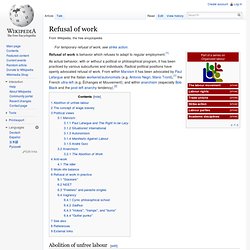
Radical political positions have openly advocated refusal of work. From within Marxism it has been advocated by Paul Lafargue and the Italian workerist/autonomists (e.g. Antonio Negri, Mario Tronti),[1] the French ultra-left (e.g. Échanges et Mouvement); and within anarchism (especially Bob Black and the post-left anarchy tendency).[2] Abolition of unfree labour[edit] The Rich economy - Antiwork. Featured Book Excerpt The RICH Economyby Robert Anton Wilson from The Illuminati Papers If there is one proposition which currently wins the assent of nearly everybody, it is that we need more jobs.
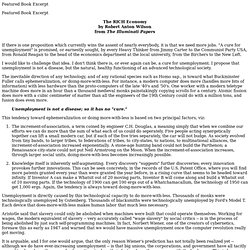
"A cure for unemployment" is promised, or earnestly sought, by every Heavy Thinker from Jimmy Carter to the Communist Party USA, from Ronald Reagan to the head of the economics department at the local university, from the Birchers to the New Left. I would like to challenge that idea. Anti work Ethic Free Time! Free Time!
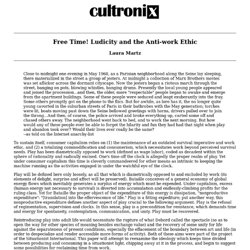
Ludicity and the Anti-work Ethic Laura Martz Close to midnight one evening in May 1968, as a Parisian neighborhood along the Seine lay sleeping, there materialized in the street a group of jesters. At midnight a collection of Marx Brothers movies was set aflicker across the dormant cityscape. Now the jesters began a riotous march through the street, banging on pots, blowing whistles, banging drums. --as told on the Internet anarchy-list To sustain itself, consumer capitalism relies on (1) the maintenance of an outdated survival imperative and work ethic, and (2) a totalizing commodification and consumerism, which necessitates work beyond perceived survival needs. Play will be defined here only loosely, as all that which is diametrically opposed to and excluded by work (its elements of delight, surprise and affect will be preserved).
"Never work! " The consumer must be conditioned from birth to hand over the "excess" wage in exchange for the excesses of capitalist production. Refusal of work. Refusal of work is behavior which refuses to adapt to regular employment.[1] As actual behavior, with or without a political or philosophical program, it has been practiced by various subcultures and individuals.
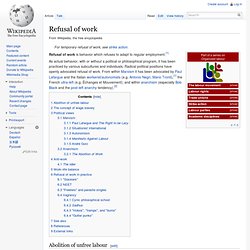
Radical political positions have openly advocated refusal of work. From within Marxism it has been advocated by Paul Lafargue and the Italian workerist/autonomists (e.g. Antonio Negri, Mario Tronti),[1] the French ultra-left (e.g. Échanges et Mouvement); and within anarchism (especially Bob Black and the post-left anarchy tendency).[2] The Abolition of Work. Synopsis[edit] He views the subordination enacted in workplaces as "a mockery of freedom", and denounces as hypocrites the various theorists who support freedom while supporting work.
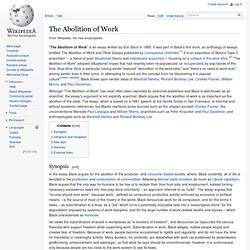
Subordination in work, Black alleges, makes people stupid and creates fear of freedom. Because of work, people become accustomed to rigidity and regularity, and do not have the time for friendship or meaningful activity. Part I: The Abolition of Work. Manifeste contre le travail. Manifeste contre le travail. MANIFESTE CONTRE LE TRAVAIL - perepeinard's posterous. Le Droit à la paresse. Une apologie des oisifs. Un article de Wikipédia, l'encyclopédie libre.

Une apologie des oisifs (titre original : An Apology for Idlers) est un essai philosophique de Robert Louis Stevenson, publié pour la première fois dans le Cornhill Magazine de et, en France, aux éditions Allia en . Dans ce pamphlet au style enlevé, R.L. Stevenson livre une critique de l'aliénation du travail dans la société industrielle. Éloge de l'oisiveté. Un article de Wikipédia, l'encyclopédie libre.
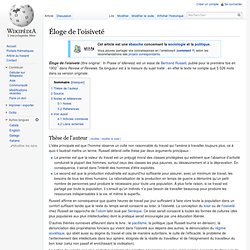
Éloge de l'oisiveté (titre original : In Praise of Idleness) est un essai de Bertrand Russell, publié pour la première fois en 1932[1] dans Review of Reviews. Sa longueur est à la mesure du sujet traité ; en effet le texte ne compte que 5 026 mots dans sa version originale. Julius Evola on Work and the Demonic Nature of the Economy. L'abolition du travail. Détruisons le travail. Critiques du travail. 12 novembre 2008 - Emile Pouget Le Sabotage (HTML) (PDF,1005.4 ko) (PDF,1018.3 ko) C’est au nom des prescriptions de cette morale spéciale que les ouvriers doivent trimer dur et sans trêve au profit de leurs patrons et que tout relâchement de leur part, dans l’effort de production, tout ce qui tend à réduire le bénéfice escompté par l’exploiteur, est qualifié d’action immorale.

Par contre, c’est toujours en excipant de cette morale de classe que sont glorifiés le dévouement aux intérêts patronaux, l’assiduité aux besognes les plus fastidieuses et les moins rémunératrices, les scrupules niais qui créent l’honnête ouvrier, en un mot toutes les chaînes idéologiques et sentimentales qui rivent le salarié au carcan du capital, mieux et plus sûrement que des maillons de fer forgé. De cette morale scélérate la classe ouvrière est donc saturée jusqu’à profusion. Whywork.org. Why Work ? Why Work ? Links. Title of Page Here CLAWS has accumulated so many great links, thanks to our supporters and discussion list members, that we've organized them by section - so now you can go directly to the ones you're most interested in.

Obligatory disclaimer: We don't necessarily agree with all the perspectives represented by the sites we link to. However, we have screened each of them for quality and relevance to our goals and mission. Newest - Most Recently Added Links!